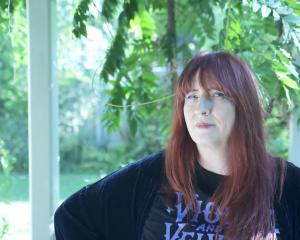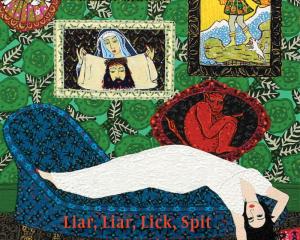For New Zealand author Deborah Challinor, historical novels are just an excuse to indulge her passion for the past, writes Shane Gilchrist.
Some days, writing comes easily to Deborah Challinor. Other times, it’s a little more difficult.

Though her friends know not to call her during the day, though her husband goes out to work ("Thankfully ... otherwise he’d make me go mental"), there are still distractions.
Sometimes the Hamilton author and historian will look up subjects on the internet when she doesn’t really need to. Or she’ll leave the comfort of a home office replete with various well-researched tomes and head to the lounge to watch Midsomer Murders during the day.
The cat, Gus, can be a problem, too, Challinor says during a recent phone interview before embarking on a nationwide promotional tour that includes several Otago dates.
"He’s troubled. He’s always scratching the wallpaper. And sometimes I can hear him sneaking into the bathroom to pee in the hand-basin. That makes me run out and shout at him."
Still, she has plenty of motivation to get in the zone.
"I just know if I don’t start writing I’m not going to get paid ... if I sit there long enough, something will come. It always does," Challinor says, adding a typical week will result in about 10,000 words.
"I can literally spend weeks in my office and I have to make an effort to go out the door and see what the world is doing. It’s probably not healthy, but I don’t care."
Challinor roams in other ways. Having written novels about convicts, smugglers, orphaned children and others, she often uses her characters as an excuse to get her hands dirty in the mud, dust and blood of history.
She loves history. She has a PhD in it (specifically, military history). She initially went to Waikato University to study English, but didn’t like it, wasn’t doing so well and thus changed her major. It turned out to be a good move.
Her 1998 doctorate notwithstanding, several of her historical novels have made the top five of the New Zealand fiction bestseller list, although her more recent works aren’t eligible, given they are published by HarperCollins Australia. Her books (including the Convict Girls series, the Children of War series and the Smuggler’s Wife series) are sold in the United Kingdom, Germany, Russia, Czechoslovakia and Australia, as well as in New Zealand.
Challinor (57) has a new one out. Titled The Cloud Leopard’s Daughter, it’s the fourth Smuggler’s Wife book involving Kitty and Rian Farrell and the adventures they get up to aboard their schooner, Katipo III.
Dunedin gets more than a brief mention as Challinor begins her latest effort in 1863, when the Otago town is a thriving yet filthy magnet for merchants and traders along with ne’er-do-wells, all of whom have been attracted by gold, famously found inland two years earlier by Gabriel Read.
Without giving too much of the plot away, the Farrell family, including grown daughter Amber, have been drawn to Dunedin by a plea from an old Chinese friend, whose daughter has been kidnapped and taken to China. Agreeing to search for the missing girl, Kitty, Rian and company find themselves puppets in various intrigues.
Their voyage from Dunedin to Sydney, Hong Kong and mainland China goes beyond the geographic. Relationships are constantly navigated and renegotiated. These include the sometimes tense relationship between Kitty and Rian and Amber, a strong-willed young woman who embarks on an affair with a crew member.
"No-one’s perfect," Challinor notes.
"All the characters have flaws. I really like writing flawed characters."
The Cloud Leopard’s Daughter includes references, both direct and inferred, to what has gone before, suggesting the writer is straddling a fine line, catering to a fan-base yet offering enough to entice a first-time reader.
"It can be read as a standalone, but I think people will get more out of it if they have read previous books in the series.
"This series has been a bit dribbly. It hasn’t been as strongly planned as some of the others, most of which follow a really tight story arc. Convict Girls certainly did, whereas this one involves a bunch of people who largely sail around the world.
"They turn up at different global events that, basically, I want to research. I never write about events I’m not interested in. I write for me, really. I write the books in order to do the research. I gather the historical bones, then cover those with fictional characters."
Despite all her research, Challinor says her books are no attempt to educate readers. There are plenty of non-fiction tomes to satisfy the curious, she points out.
That said, she does attempt to provide a reasonably accurate view of events.
"When I do tweak, my God, I feel guilty. That’s why I always let readers know I’ve done it via the author’s notes.
"Sometimes the event will be static; other times it will be a series of events, such as this one, where this band of yobs roam," Challinor says, adding she has plans for a fifth and, likely, final novel in the Smuggler’s Wife series.
She has other plans, too.These include writing a trilogy that picks up the story first kindled in her 2007 standalone novel Fire, based on the Ballantynes department store fire of November 18, 1947, in Christchurch (the worst in New Zealand history, the blaze killed 41 people).
"The first book is set in Auckland in 1955; the second in King’s Cross, Sydney, in the mid-’60s; and the third is set mostly in Vietnam."
Challinor has written about Vietnam before. Her 2009 non-fiction work, Grey Ghosts, was based on the research she did for her PhD on New Zealand soldiers and the Vietnam War, and 2000 publication Who’ll Stop the Rain? detailed the effects of Agent Orange on the children of Vietnam veterans.
In 1995 she won a New Zealand Returned and Services’ Association Military History Scholarship, and in 1997 received a New Zealand History Research Trust Fund Award and funding from the New Zealand Lottery Grants Board for the first edition of Grey Ghosts.
"I can remember seeing Vietnam on the television when I was little ... I’m not interested in guns or any of that, even though I was in the Territorials, mainly because we got cheap petrol and cheese — don’t ask me why.
"But I am interested in the effects of war on people."
Challinor is also interested in the evolution of her own, fictional, characters. They are almost friends, she says.
"One advantage to writing a series is you don’t have to learn new characters all the time. And it’s fun to get to know your characters, to get to live with them for a couple of years and go on a journey with them.‘‘I mean, when I finished Convict Girls I really missed those women. And they weren’t even real."
See her
Deborah Challinor will appear at the following venues:
• Cromwell Paper Plus, Monday, November 21, 5.30pm
• Gore Public Library, Tuesday, November 22, 7pm
• Invercargill Libraries, Wednesday, November 23, 5.30pm
• Winton Memorial Hall, Thursday, November 24, noon
• Dunedin City Library, Saturday, November 26, 11am
The book
The Cloud Leopard’s Daughter ($34.99) is published by HarperCollins.












